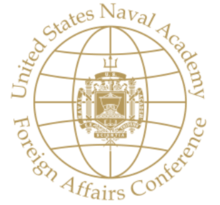Naval Academy Foreign Affairs Conference
The Naval Academy Foreign Affairs Conference (NAFAC) is an undergraduate foreign-affairs conference in the United States. NAFAC seeks to explore current, demanding issues from both a civilian and military perspective and thus to provide a forum for addressing pressing international concerns. Held at the United States Naval Academy in Annapolis, Maryland since 1961, NAFAC brings together Naval Academy students and their civilian and military counterparts from around the world to share ideas and concerns relating to international affairs.
| Naval Academy Foreign Affairs Conference | |
|---|---|
 | |
| Genre | Foreign Affairs Conferences |
| Venue | United States Naval Academy |
| Location(s) | Annapolis, Maryland |
| Country | United States |
| Attendance | 150+ Undergraduates |
| Website | http://usna.edu/NAFAC/ |
Past speakers include: George H.W. Bush, Joseph Biden, Stephen Hadley, Madeleine Albright, Condoleezza Rice, Robert Gates, Wesley Clark, Charles Krauthammer, Sheryl Sandberg and Hillary Clinton.
The 2020 NAFAC Conference will take place April 7th-9th at the United States Naval Academy. The theme will be War, Peace, and the Gray Zone and can be described by the following: Between war and peace lies a gray zone. Competition has become covert and continuous and rests on deception, disinformation and deniability. Rogue and revisionist powers challenge the U.S. in ways that aren’t quite provocative enough to merit a conventional response. Adversaries craft false narratives that supplant the truth, send “little green men” across borders, brazenly steal intellectual property, interfere in elections, and weaponize social media. While none of these are traditional elements of warfare, they are certainly not elements of peace. Actors such as China, Russia, Iran, and North Korea appear to operate comfortably in this gray zone, while the US and its allies may be a step behind. This conference aims to cast light on these shadowy practices and to assess the prospects for a more tangible peace.
Structure
Each year a unique theme is chosen for NAFAC; noteworthy individuals with expertise in relevant fields are invited to address the conference delegates who represent colleges and universities from across the United States and around the globe. Conference attendees bring with them unique attitudes and approaches that, through discussion and interaction, are intended to enlighten the thinking of their peers.
The entire conference is organized and run by United States Naval Academy Midshipmen. These future officers of the Navy and the Marine Corps also serve as moderators, presenters, and as a minority percentage of delegates.
Harvard University and the United States Senior Military Colleges are examples of schools with annual partnerships to sponsor delegates to NAFAC.[1]
NAFAC is proud to have a reciprocal exchange partnership with the MSC Student Conference on National Affairs at Texas A&M University, which was founded in 1955. A Naval Academy Professor, United States Army COL Rocco Paone, served as a facilitator in 1962 for MSC SCONA 8 immediately after founding NAFAC and thereby a partnership lasting into the present day.[2][3]
NAFAC Topics
1961- Founding Year [4]
1996 - A New Multilaterlism
1997 - The Struggle for Democracy
1998 - Asia Rising?
1999 - Keeping Peace
2000 - Civil-Military Relations
2001 - Terrorism
2002 - Central and Southwest Asia
2003 - Strangers in a Common Land: Preserving Israel and Palestine
2004 - Post-War Reconstruction: Iraq
2005 - Power and Purpose: Defining America's Role in the World
2006 - Africa: Turning Attention into Action
2007 - Asia At The Crossroads
2008 - Latin America
2009 - Bridging the Gap: Combatting Global Poverty
2010 - National Security Beyond the Horizon: Changing Threats in a Changing World
2011 - People, Power, and Politics in the Internet Age
2012 - The Eclipse of the West?
2013 - Time of Transition
2014 - Human Security in the Information Age [5]
2015 - Sustainability and Sovereignty: Global Security in a Resource-Strained World
2016 - Women and Security : The Implications of Promoting Global Gender Equality
2017- A New Era of Great Power Competition?
2018 - Guarding Liberty in a World of Democratic Undoing
2019 - Coming Apart: The Fate of the Rules-based Order
2020 - War, Peace, and the Gray Zone
References
- "Student Conference at the United States Naval Academy (NAFAC)". Retrieved 2017-08-28.
- "The Eagle from Bryan, Texas on November 28, 1962 · Page 10". Newspapers.com. Retrieved 2017-05-29.
- "The Eagle from Bryan, Texas on August 19, 1962 · Page 5". Newspapers.com. Retrieved 2017-05-29.
- "NAFAC: The Naval Academy Foreign Affairs Conference". UNH Tales. Retrieved 2017-08-28.
- "NAFAC: The Naval Academy Foreign Affairs Conference". UNH Tales. Retrieved 2017-08-28.
External links
- usna.edu/NAFAC/ Official Website
- https://www.facebook.com/USNAFAC/ Facebook Social Media Page